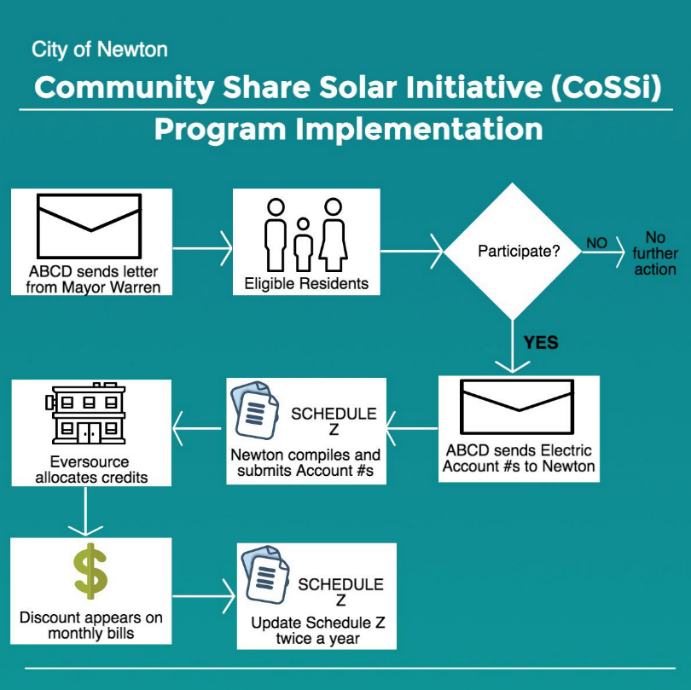Typically, low income households pay a higher percentage of income for electricity than those in other income brackets. In Boston, for example, median-income households spend 2.8 percent of their total income on electricity on average, whereas low-income households spend 6.7 percent of income on electricity. At the same time, disadvantaged households often do not have the ability to install solar panels, which can help reduce energy costs. Even with the recent increase in affordability of residential solar, several factors often keep this demographic from taking advantage. Often, they do not have the capital and appropriate financing mechanisms to pay the upfront costs of buying and installing solar panels. In addition, low-income households are often renters or live in multi-family homes, meaning they often don’t have the authority to initiate installation.
The City of Newton has found a simple solution to this challenge – one that provides the financial benefits of clean energy adoption directly to low-income residents. Newton’s Community Solar Share Initiative (CoSSI) is a cooperative pilot program being run by the City of Newton, its solar developer Ameresco, energy provider Eversource, and Action for Boston Community Development (ABCD), which administers many low-income energy programs in the Boston metro area.
Here’s how it works: Newton contracted with Ameresco to design, build, and operate a solar canopy at their Department of Public Works parking lot. The City, through a Power Purchase Agreement (PPA), will buy back the net metering credits (the monetary value of the renewable energy generated) from the solar developer at a discounted rate and will split the net metering credits with low-income households, giving them 40 percent of the credits. Eversource has agreed to use the Schedule Z, submitted by the City, to reallocate the net metering credits to participating low-income ratepayers. ABCD identified all Newton ratepayers on the low-income energy rate and communicated with them on behalf of the city.

This model could easily be replicated in your city or town to provide benefits directly to low-income residents before or after a municipal renewable energy project is installed. Here are three operating principles to keep in mind when considering such a program:
Don’t start from scratch – leverage existing mechanisms. Existing net metering policy in Massachusetts already provides a procedure for sharing net metering credits with eligible customers through the Schedule Z form. The City of Newton worked with ABCD to inform all of the households in the City that qualified for the utility’s R-2 low income discount rate about the initiative. Residents had a 30 day window to opt out of the program. At the end of the opt-out period, ABCD provided a list of about 1,100 anonymous electric account numbers to Newton. This list of households to receive a portion of net metering credits from the DPW project was then sent to Eversource on the Schedule Z. The City anticipates that each household will save $50-$60 per year through this program.
Build strong partnerships with your electric utility and community partners. For the City of Newton, ABCD was a critical partner in ensuring the success of the program. ABCD provided the connection between the City and Eversource, and also the information necessary to contact residents, whose identities are strictly confidential under low-income discount rate program. ABCD helped to facilitate an agreement between Eversource and the City whereby Eversource, which shares a strong commitment to helping low-income residents, agreed to accept and manage a Schedule Z for a much larger number of accounts than is typical for net metering credit allocation.
Find ways to connect low income residents to clean energy. This model for community shared solar empowers cities and towns to use the installation of renewable energy resources toward a broader public purpose by giving back to members of the community who are in the most need and are the most burdened by energy costs and the impacts of climate change. The City of Newton sees CoSSI as a starting point for continued engagement with low-income residents about renewable energy, energy efficiency, and their involvement in Newton’s clean energy future.
Newton’s Community Solar Share Initiative is just one approach to the challenge of increasing access to clean energy for low income residents. CoSSI demonstrates a simple but powerful way to use the existing solar policy structures in Massachusetts to transfer some of the financial benefits of solar power directly to low-income residents.
If you’re interested in learning more about this model and other approaches to implementing low income community shared solar, sign up for MAPC’s Clean Energy Update and stay tuned for an upcoming webinar in March.
